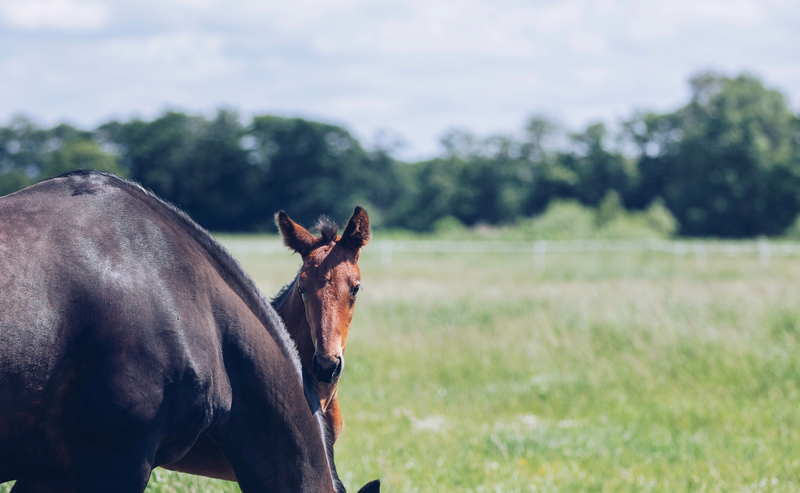Buying a horse - How to protect yourself
- Equine Law UK

- Aug 27, 2025
- 6 min read
Buying a horse is to many equine enthusiasts a substantial investment. It is therefore important that, not only you thoroughly research the horse you have in mind before buying, but also that you protect yourself with a written sale agreement.

Checklists
You either love them or you hate them, but a checklist is an essential part of all horse viewings. It is essential that you take a checklist of things to ask about the horse and make notes of what the seller says.
Your checklist should include:
How is the horse in the stable?
Is the horse good to catch, clip, box (in a horsebox and/or trailer) and shoe?
Does the horse hack alone and in company?
Does the horse have any vices?
Are you aware of any behavioural problems (napping, rearing, bucking) in your ownership or before?
Does the horse have any history of lameness, injury or illness?
Can I see the horse’s passport? Ensure you see this and check it thoroughly before you go as far as making an offer to purchase.
Will you disclose the horse’s veterinary history (a computer printout from the seller’s vet and any other vet who may have treated the horse e.g. a specialist vet).
If the seller is not prepared to disclose the veterinary printout you should ask yourself why and not go ahead with purchase unless you are happy with the explanation.
Ask the seller to sign and date the checklist.
If your new horse turns out to be different to the way he was described before purchase, the amount of research that you did before buying the horse, and whether you have a sale contract in place, will affect whether or not you have a legal right of recourse. This is when the checklist, complete with the handwritten recording of the answers given by the seller (ideally signed and dated by the seller), are extremely useful.
Deposits
Some sellers insist upon a deposit. This is understandable where other people are being turned down to view a horse pending a vetting for example. It is however essential that a simple deposit agreement is signed so that the terms of the deposit payment are clearly agreed before the deposit is paid. Disputes often happen when a seller says that the deposit was non-refundable and the buyer says that is was refundable if the horse fails the vetting.
These disputes can easily be avoided with a deposit agreement – these are available to buy on the Equine Law UK website.
Sale and Purchase Agreements
Once the horse has been vetted, you can then arrange a sale and purchase agreement which must be signed before payment is made. The sale agreement (a written agreement) needs to include:
Name and addresses of the parties;
Date of purchase and date of completion of the contract;
Details of the horse;
Purchase price and how funds are to be paid;
Any vices/behavioural problems disclosed to the buyer;
Any illnesses disclosed to the buyer;
Exactly when and how the purchaser will be allowed to return the horse for breach;
A time limit within which a complaint must be made or the animal returned.

Buying from a Trader/Dealer
The Consumer Rights Act 2015 (CRA) imposes implied terms of fitness for purpose and satisfactory quality where a horse has been sold in the course of a business (defined as a business or a person’s craft, trade or profession). It is important to note that for the implied terms of the CRA to apply, the seller must be selling in the course of business and must not be a private seller. In the event of a dispute these statutory terms can be relied upon by the purchaser (the seller cannot contract out of these implied terms).
Private Sale
If the seller is selling privately, the purchaser cannot rely on the terms implied by the CRA. In this situation the rule of caveat emptor (‘buyer beware’) applies and the purchaser must prove that the horse was not as described and/or has been misrepresented to them by the seller. The buyer also has to prove that the representations were made to induce the buyer into the purchase agreement and that the buyer relied upon those representations when deciding to buy the horse. Where the purchaser is unable to prove that the horse is not as described/has not been misrepresented there will be no comeback over undiscovered problems or vices unless the purchaser has an express agreement with the seller.
Horse prices usually run into thousands of pounds, yet purchasers are still handing over large sums of money without obtaining a sale agreement, the price of which is very inexpensive in comparison to the price of an average horse or pony.
Top Tips for the Buyer:
Insist upon having a written purchase agreement, which should fully detail how the horse has been described to you.
Always view a horse prior to purchase. It is almost impossible to assess whether a horse is suitable for you unless you have seen and tried it.
If possible try the horse more than once. Go with an experienced friend or trainer. Do as much with the horse as you can. If you want him to jump then ask to jump the horse; if the horse is to hack, ask to hack him out alone and in company.
Have Rider Insurance cover to protect you in the event of an accident for provides personal accident, emergency vets’ fees and third party liability cover in respect of any horse you ride.
Have the horse vetted and go to the vetting so that you can discuss the vet’s findings as they go along. Tell the vet what you are purchasing the horse to do and ask the vet to confirm how the horse has behaved at the vetting (if you are unable to attend).

Buying Private v Trade
When buying from a trader you have the additional protection of the terms implied by the CRA (the terms of fitness for purpose and satisfactory quality). You also have a short term right to reject a horse when you buy from a trader, allowing you 30 days from delivery to reject/ request a repair or replacement. This protection is not available in a private sale. That said I see many cases where private sellers sell their own horses to ensure that they go to the best home – that is usually because the horse has been a great asset to them and it is important that they find the perfect home. Many great horses are sold privately and so the lack of protection under the CRA should not put you off buying privately.
Buying via an Agent/Sales Livery
It is far more common recently to see horses advertised on behalf of their owners by dealers/sales agents/sales livery agents. It is imperative to note that if you are told that the sales agent is selling on behalf of an owner and that owner is private, even if the sales agent is a trader, the sale of the horse will be a private sale because you are contracting with the private seller, not the sales agent.
My advice therefore is that you should ALWAYS speak to and/or meet the owner before going ahead with the purchase. I have come across many cases where sales agents do not disclose the full history of the horse despite being fully advised by the owner. The owner is ultimately responsible for the information and representations made to the seller about the horse and this is why I strongly advise that the seller speaks to the potential purchaser before purchase.
I also advise that the horse’s clinical history is disclosed to the purchaser and to the vetting vet so that there is no dispute as to the horse’s veterinary history. This can easily be requested by calling you vet(s) and asking for the clinical history to be emailed to you.
Buying Unseen
If you buy a horse from a trader/dealer unseen, if you are a consumer then you are protected by the Consumer Contracts Regulations and so can return the horse for any reason within 14 days of delivery. You can therefore return the horse because you do not like the colour or have simply changed your mind. Do ensure that the trader accepts that this Regulation applies to them before you go ahead with the purchase as problems often arise when buyers think that they are protected by this legislation only to find that the trader denied that that are a trader after purchase or alleges that the buyer is not a private buyer/acting in the capacity of a consumer.
This only applies to a sale from a trader/dealer to a consumer and the horse must have been purchased unseen.
Buying from Abroad
Buying from abroad has become far less desirable since we exited the EU. Pursuing a seller in a different legal jurisdiction is expensive and challenging. If you do buy a horse from another jurisdiction I advise that a sale agreement is drawn up and signed and that the agreement provides for English Law to apply in the event of a dispute. This does not solve the issue of pursuing a seller for monies owed if you succeed in claiming against them but it does solve the issue of the case being heard and held in a Court in England/Wales.
For further information on equine law visit www.equinelawuk.co.uk
Disclaimer
The materials and opinions contained under our 'Advice' pages are for general information purposes only, are not intended to constitute legal or other professional advice, and should not be relied on or treated as a substitute for specific advice relevant to particular circumstances. HorseQuest makes no warranties, representations or undertakings about any of the content of the 'Advice' pages (including, without limitation, any as to the quality, accuracy, completeness or fitness for any particular purpose of such content).
.png)







Comments